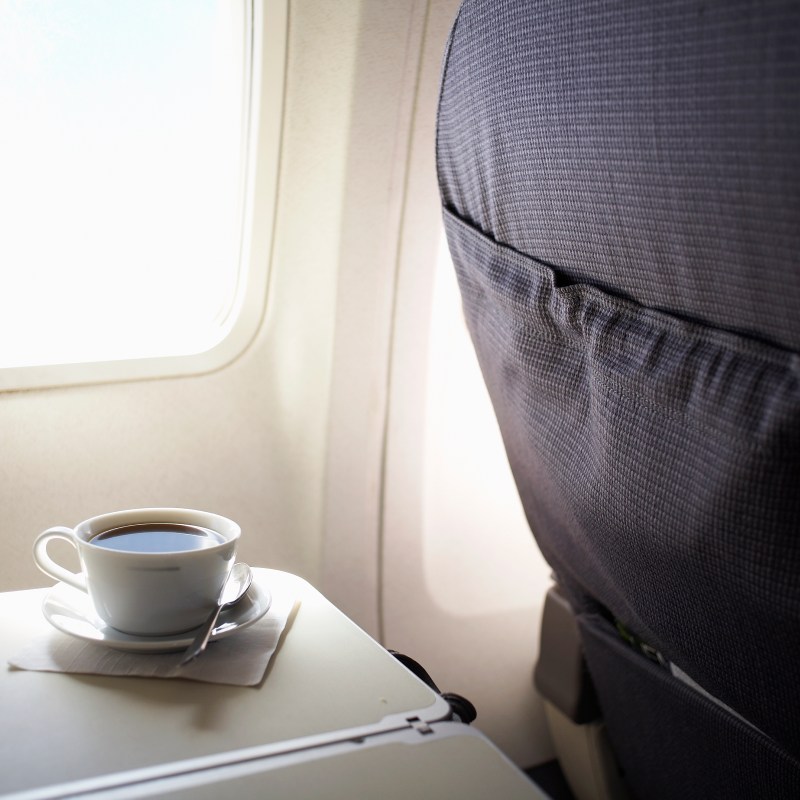
Airplanes are magical in that they fly us around the world, shrinking journeys that would have taken months into a single day.
Videos by TravelAwaits
On the other hand, airplanes are also a prime spot to get magically sick as a dog.
If it’s not the airborne bacteria and viruses soaring through the cabin, it might be your own poor choice in food and beverage that tilts you into tummy-ache and headache territory.
Staying healthy on planes and in the days following a long plane journey is difficult, even when you take the right supplements and bring the right snacks with you. Above all, many travelers recommend avoiding airplane coffee, tea, and ice at all costs, citing poor cleaning practices and bacterial growth in the storage containers.
What’s actually going on with an airplane’s potable water supply? And do you actually need to avoid airplane coffee, tea, and ice like your life depends on it?
Follow the water
Airplanes use massive water tanks to store potable water that is used to make coffee, tea, and ice throughout the journey. Most vessels have a 200-liter tank or multiple tanks with a similar volume, but that depends on the airplane, passenger count, and route.
Some of this water is also diverted for lavatory usage, meaning the vast majority of planes have a single potable water supply. (Don’t worry, water supplies are transferred to separate vats away from the main tank before being diverted to the lavatories.)
So, what’s going on in that big, bad tank where all the potable water is stored?
Here’s the first good news. That water supply is usually kept chlorinated to ensure it’s safe to drink, just like our tap water.
According to pilots, attendants, and other flight staff, these tanks are also regularly cleaned. Usually, the cleaning process involves dumping a diluted bleach agent into the tank, then flushing it out multiple times. (No scrubby-scrubby, unfortunately.)
Let’s move on to the equipment used to serve you beverages. The water tank is the main concern for passengers who are concerned about bacteria, but don’t forget about the coffeemakers, kettles, and ice trays. If those aren’t cleaned, a sparkling water tank doesn’t mean much.
The arguments for drinking airplane coffee
It probably doesn’t come as much of a shock, but airplanes are subject to tight regulations—at least, when it comes to how they operate. (Those regulations are much more lax when it’s time to get compensated for a delayed flight, but I digress.)
Within operational regulations are cleaning practices.
Here’s the argument for drinking airplane coffee, tea, and drinking beverages over ice: airplane water tanks are regularly disinfected and cleaned in separate processes. There are also new types of treatments that are helping improve water quality, including ozone treatments.
On top of that, most coffeemakers, kettles, and ice trays don’t last long thanks to overuse, meaning contamination isn’t a huge issue there, either. I’ve also seen arguments that the high temperatures used to make coffee and tea can help kill any problematic bacteria and viruses.
The most sterling badge of approval seems to be the fact that pilots still drink airplane coffee regularly. If it was going to get you sick, it would have taken down leagues of pilots by now.
(In a highly meta moment, I’m actually publishing this article while on an international United flight, and I am drinking the coffee, my friends.)
The arguments against drinking airplane coffee
Based on the information above, you could make the argument that airplane coffee won’t make you sick—but that’s a far cry from it being actually good for you. Just because it won’t kill you doesn’t mean you should drink it, in other words.
Though an airplane’s potable water tank is subject to regulation, it’s also subject to human error.
Was the right amount of chlorine used to disinfect the water tank? And was the tank thoroughly cleaned with bleach, then flushed enough times? It’s a finely tuned process that’s easily thrown off by a single mistake.
If you’re suspicious of water quality on airplanes, it’s best to avoid drinking airplane coffee, tea, and ice. That being said, if you have faith in the process and don’t usually get sick on planes, I wouldn’t worry too much about enjoying a hot beverage.
